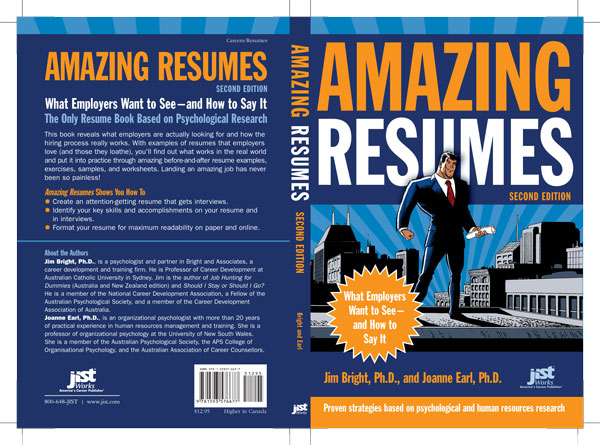Extract from Amazing Resumes by Jim Bright & Jo Earl, published by Jist
This post covers issues to do with CV layout, and how to deal with your education and qualifications on your resume. Before the extract is a short background to the book.
Background
The material comes from my book Amazing Resumes. This book is the culmination of over 10 years of scientific research into what gets resumes shortlisted. My co-author Jo (now Dr Jo!) Earl completed her Masters Thesis in Organizational Psychology working with recruiters on what gets resumes shortlisted. Her work and that of many more of my team is included in this book. It means the advice you get has been demonstrated empirically to impress recruiters.
Why not become part of growing international movement who have found this book to be an essential part of their job search strategy. The sister title in the UK, Brilliant CV, is a decade old best-seller in its 4th edition just out. In Australia, Resumes that get shortlisted continues to be a leader, and the book is now in a Chinese version too!
We are proud of this book, and if you are a professional advising others or know someone who needs some help, we invite you to get hold of a copy through Amazon as we are sure you’ll find it will support your important work and most importantly help others get that all important job..
Which Resume Is for Me?
Our extensive work has found that hiring managers prefer resumes that look conventional. This has been found in studies throughout the world. Most managers are conventional people, and they have a clear idea of what they expect to see when they read a resume. Reading a resume is a bit like walking into a restaurant—we know what to expect. In a restaurant, we know that there will be tables and a menu, that we will be asked for our order, and that we will have to pay for the food. We might even expect to leave a tip! Receiving an unusual resume would be like walking into the restaurant and seeing no tables or serving staff. We might figure out that there is a food vending machine to use, or alternatively, we might just walk out. Similarly, an employer might persevere with an unusual resume, or he or she might just reject it.
Before we look at some actual examples, we will take a look at what things you should put in your resume. The following is our list of important elements of a resume.
Tip: Use our 4-S rule: Keep it Simple, Structured, Succinct, and Significant.
Essential Contact Details
Always include your
- Name you want to be known by—for example, “James Bright” and not “James Edward Harold Bright”
- Home address
- Telephone number
- Fax number
- E-mail address
Only give contact details for places where you are prepared to be contacted by prospective employers. If receiving a call or an e-mail at your current workplace might lead to embarrassing questions from your boss, do not give work contact details. Of course, if you want to include an e-mail address, it is now very easy to get a free e-mail account on the Web from companies like Hotmail (www.hotmail.com).
You must put your name, address, and telephone number on the first page of your resume.
Education and Training
If you haven’t had any formal education, obviously you omit these elements and should be thinking of using the functional or the structured interview resume. Have a look at the ideal candidate you constructed from the job ad in Chapter 4. What qualifications is our potential employer looking for? These qualifications are the ones to focus on.
Tip: Do not bore the reader by listing every qualification you have obtained—keep it to the relevant and impressive stuff.
Go through the list of qualifications you made in chapter 6 and determine which are relevant to the job. List the relevant ones in order. Some qualifications, like a college degree, are regarded as relevant information in most circumstances. Other qualifications, such as a first-aid course, may be seen as useful for some jobs, but would look odd being listed for others.
Although we have not researched where your educational details are best positioned, we find that what works best depends on how important and impressive your qualifications are to the position. Ask yourself the questions “How important are my qualifications to this position?” “How impressed will employers be by my degree I have or the school that I attended?” “What is most impressive, my qualifications or my work achievements?” If the answers to these questions are in favor of your educational qualifications, then place them toward the top of your resume (after the career objective statement or competencies and before your work achievements). If you answer in favor of your work achievements, then place educational details after your work details.
Our colleagues agree you should take a tailored approach to positioning details of your education where they are needed most. Wendy Enelow, author of the Expert Resumes series of resume guides, recommends that you “load” the resume—upfront—with your greatest selling points. Susan Britton Whitcomb, author of Résumé Magic (2003), has an excellent three-year rule of thumb for determining where to position your education. If you received a degree that is relevant to the vacancy in the last three years, place it toward the top of your resume. If you graduated more than three years ago and you have relevant work achievements to be proud of, place these first. Louise Kursmark, author of Sales and Marketing Resumes for $100,000 Careers and many other books, suggests that education be viewed as a foundational credential rather than as a key selling point. Remember, don’t waste prime resume “real estate” on something that will never sell.
Tip: Be clear and concise, and always refer back to the job ad to ensure that you’re remaining relevant.
When you do include your educational qualifications, you should order them as follows:
- Highest postgraduate qualification—Masters or Ph.D., the subject, and the university at which the degree was earned
- Highest undergraduate qualification—the degree, the subject, and the university at which the degree was earned
- College qualifications—what college you attended and your grade-point average
This point may not apply to many people at all, but should you have a Ph.D., bear in mind that the title of Ph.D. dissertations can often appear to be so obscure or trivially narrow as to detract from a great achievement. Believe us, we have heard the sniggers that sometimes accompany Ph.D. award presentation ceremonies! If you have a very specialized title that is not going to be directly relevant to the job you’re applying for, stick to the subject discipline name (such as chemistry, physics, English, or psychology). For example, if you’re applying for a research role, a title such as “An investigation into the antecedents and consequences of brown squirrel mating rituals” might be better referred to as “Biology”—unless you are applying for a job that requires you to specifically monitor squirrels.
If you have a degree, it is probably not necessary to include your high school results unless they are exceptional. A degree will lead most employers to credit you with a certain amount of intelligence.
What might be useful is to list a few subjects you covered in high school, to give an indication of your versatility. For instance, if you have an arts degree, it is probably worth listing “courses included mathematics, chemistry, and statistics” or other numerate subjects studied at high school, as this gives an indication of well-rounded abilities. The opposite applies to science graduates, who might list English and history if applicable. List any extra languages that you speak, but see our later section on bias.
If there is any special thesis topic or aspect of your studies that is particularly relevant to the job, mention it here. With all qualifications, do not assume that the reader will understand what they are.
If you are applying for a job in the same country and state in which you were trained, and the qualification system has not changed in the last 10 years, it is safe to assume that the employer will understand the meaning of your qualifications. Otherwise, do not assume anyone else will understand your qualifications, and if in doubt explain what they mean.
Tip: When applying for a job in another state or country, don’t assume employers will understand what your qualifications mean. Explain your grades and degrees in the employer’s local system.
You can buy a copy of Amazing Resumes here
Related Posts








Wonderful post. I’m currently facing a few of these matters too.